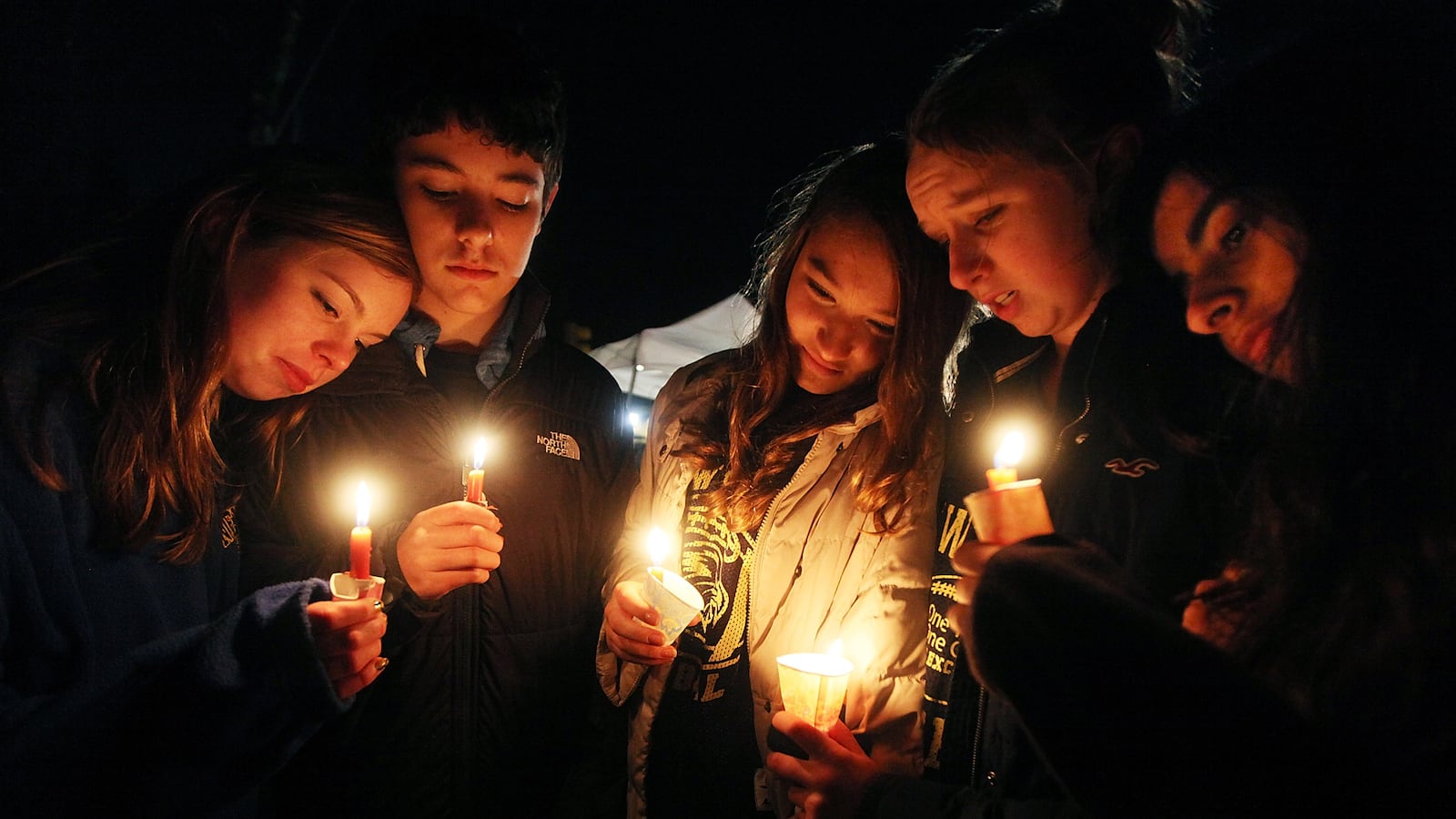Peter King is not one to sugarcoat his message. The two-decade veteran of the House of Representatives wears his Fighting Irish bona fides with pride. In his office, the walls are lined like a Queens pizzeria with photos of King and various political celebrities, a Notre Dame rug covers the floor, and a basketball backstop emblazoned with his alma mater’s dukes-up leprechaun mascot hangs in the corner. So when families of some of the victims of the Sandy Hook Elementary School shooting paid the New York Republican a visit this week, he did not shy away from telling them how hard it would be to round up House support for a bipartisan bill he is sponsoring to enhance background checks: “Hate to say it, but I haven’t heard the issue come up since December.”

And yet, Nicole Hockley, Francine Wheeler, Mark Barden, Neil Heslin, Nelba Marquez-Greene, and Bill Sherlach, huddled in chairs around the Notre Dame carpet, didn’t flinch. They have heard this many times in the six months since Adam Lanza blasted his way into the school in Newtown, Connecticut, and cut short the lives of 20 children and six educators—including their beloved sons, daughter, and spouse. As King headed to the floor for a vote, he warned that the furor over the surveillance of telephone and Internet data would further fuel the mistrust of government that stymied a Senate bill on background checks in April. In unison, Hockley, Wheeler, and Barden reassured him: “We aren’t going away.”
Given the failure of Congress to strengthen gun-safety laws—even after a massacre as horrific as the one at Sandy Hook on December 14—it would be easy to take pity on these families. But the accomplishments this group has managed to achieve in a very short time are manifold. In Hartford, they persuaded legislators to strengthen Connecticut’s gun-safety laws and pass a mental-health statute that increases access to care. And at the invitation of several governors, they have traveled to states to advocate for common-sense legislation. For instance, when legislators in Delaware balked at a bill Gov. Jack Markell wanted passed, Barden personally called the cellphones of recalcitrant politicians and set up meetings. Two days later Markell signed House Bill 35 into law, ensuring most private gun transfers are subject to the same background-check rules applied to sales by licensed dealers—the kind of common-sense law that Congress has failed to pass. “Your presence reminds us why we took up this legislation in the first place," the bill's sponsor, Rep. Valerie Longhurst, told Barden, his wife, Jackie, Marquez-Greene, and Hockley at the signing.
After seeing them tirelessly walk the halls of the administrative office buildings of the Senate and House, pour their hearts out in countless media interviews and editorials, and otherwise put their lives on hold for the last six months, no one would blame them if they ended this seemingly quixotic quest. But they show no signs of giving up.
They do it because they nobly believe no parent, spouse, or sibling should ever experience similar suffering. These families showed the almost-indescribable courage to not just shake off their grief and get out of bed in the morning, but to advocate for meaningful changes on all the issues that lead to gun violence—mental health, community and family, and gun responsibility. In more than 100 meetings with legislators in Washington; Hartford; Trenton, New Jersey; Dover, Delaware; Springfield, Illinois; and elsewhere, they have told their stories. And though victory has eluded them in Washington thus far, they have tasted enough success to give them the courage to continue, aware that they have just rounded mile one of a lifelong marathon.
Their travails are especially heartening to me. The morning after the shootings occurred in the town I have called home, on and off, for 43 years, I banded together with neighbors and friends to try to make some sense of this senseless act of violence. As 26 grieving families awoke to contemplate life without their loved ones, some of the more fortunate of us gathered on Holcombe Hill, Newtown’s highest point, to console each other and ask what we could do to help the town heal, to change the laws and attitudes of the land, and to ensure this unthinkable tragedy could never happen elsewhere. Out of this, we founded Sandy Hook Promise, a grassroots group dedicated to ensuring that December 14, 2012, will mark the apex of gun violence in America and the tipping point for passing sensible gun laws.
Unfortunately, since Sandy Hook, there have been more than 5,000 gun deaths in the country. Just as mass shootings in Tucson, Arizona, and Aurora, Colorado, and at Virginia Tech were committed by men with mental illness—and with unconscionably easy access to lethal weapons—five people were killed last week by a gunman in Santa Monica, California. This is why the families of Sandy Hook are willing to give the Senate, which narrowly defeated a bipartisan bill to enhance the system of background checks, another chance.
They know it won’t be easy. They’ve already met, again, with senators who opposed the bill sponsored by Joe Manchin and Pat Toomey and House leaders who, though they profess to share their pain, held out no legislative remedy. Yet as frustrating as these meetings can be, their approach continues to rise above partisanship. "When you are on the other side of something like this, you're not afraid anymore,” Wheeler told one congressman Tuesday. “We’re not yellers,” Marquez-Greene told another. “Just tell us what we can do to help, because we are not going anywhere.”






